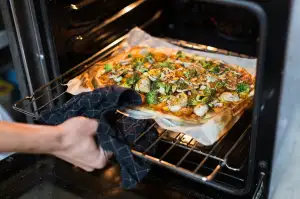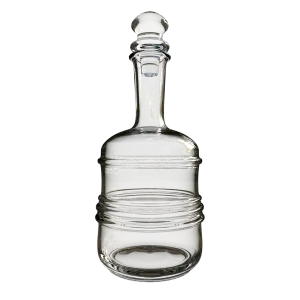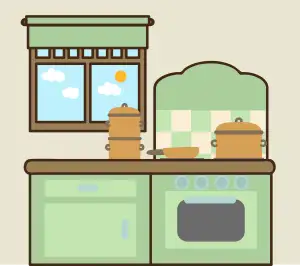Ant Invasion in the Kitchen? Discover Effective Ways to Get Rid of Ants and Reclaim Your Culinary Sanctuary!

Ants invading your kitchen can be a frustrating and unsightly problem. Not only do they contaminate food, but they can also pose health risks. It's essential to take immediate action to get rid of these unwanted guests and reclaim your culinary sanctuary. In this article, we will explore effective ways to identify the source of the ant infestation, clean your kitchen thoroughly, seal off entry points, use natural deterrents, set up ant traps, and when it may be necessary to call a professional exterminator. By following these steps, you can eliminate ants from your kitchen and enjoy a pest-free cooking experience once again.
Identify the source of the ant infestation
Identifying the source of an ant infestation is crucial in effectively getting rid of these pesky invaders. Start by observing their trails and tracking them back to their entry point. Common sources include cracks in walls, gaps around windows and doors, or even through pipes and electrical wiring. Once you have identified the entry point, inspect the area for any signs of food or water sources that may be attracting the ants. Keep in mind that ants are attracted to sweet, greasy, and sugary foods, so make sure to store these items securely and clean up any spills or crumbs promptly. By pinpointing the source of the infestation, you can take targeted action to eliminate it and prevent future invasions.
Clean the kitchen thoroughly
To effectively get rid of ants in your kitchen, it is crucial to start by thoroughly cleaning the area. Ants are attracted to food residue and crumbs, so a clean kitchen will make it less appealing for them to invade.
Begin by removing all sources of food from countertops, cabinets, and pantry shelves. Wipe down surfaces with a mixture of vinegar and water or a mild dish soap solution. Pay special attention to areas where spills or crumbs may have accumulated, such as behind appliances and in corners.
Sweep or vacuum the floors to eliminate any remaining food particles. Empty and clean your trash can regularly to prevent odors that may attract ants. Make sure to seal all garbage bags tightly before disposing of them.
Additionally, wash dishes promptly after use and store them in sealed containers if possible. Keep fruit bowls covered or refrigerated, as ripe fruits are a common target for ants.
Remember that maintaining cleanliness is key in preventing future ant infestations. By eliminating their food sources and keeping your kitchen spotless, you can reclaim your culinary sanctuary from these pesky invaders.
Seal off entry points
Sealing off entry points is crucial in preventing future ant infestations. Start by inspecting your kitchen for any cracks, gaps, or openings where ants can enter. Common entry points include windows, doors, and gaps around pipes and wires.
Use caulk or silicone sealant to fill in these gaps and cracks. Ensure that all windows and doors have tight-fitting screens or weather stripping. Pay special attention to areas where food is stored, such as cabinets and pantry shelves.
Additionally, keep your kitchen clean and free of food debris to discourage ants from entering. Wipe down countertops regularly, sweep the floors, and promptly clean up any spills or crumbs. Store food in airtight containers to prevent attracting ants.
By sealing off entry points, you create a barrier that prevents ants from infiltrating your kitchen. This step, combined with other preventive measures, will help maintain a pest-free culinary sanctuary.
Use natural deterrents
If you prefer a more eco-friendly approach to dealing with ants, there are several natural deterrents you can try. One effective option is using vinegar. Ants dislike the strong smell of vinegar, so mix equal parts of water and white vinegar in a spray bottle and spray it along their trails or entry points. This will disrupt their scent trail and discourage them from returning.
Another natural deterrent is cinnamon. Sprinkle ground cinnamon near windowsills, doorways, or any areas where ants are entering your kitchen. The strong aroma of cinnamon acts as a barrier and repels ants.
Peppermint oil is also known to be an effective ant repellent. Mix a few drops of peppermint oil with water and spray it around your kitchen countertops, cabinets, and other areas where ants are present. The strong scent of peppermint will deter ants from coming into your kitchen.
Citrus fruits like lemons and oranges can also help keep ants away. Squeeze some lemon or orange juice onto cotton balls and place them near ant trails or entry points. The acidic nature of citrus fruits disrupts the ants' pheromone trails, making it difficult for them to navigate.
Finally, consider using diatomaceous earth as a natural ant deterrent. This powdery substance is made from fossilized remains of tiny aquatic organisms called diatoms. Sprinkle diatomaceous earth along ant trails or near entry points. When ants come into contact with it, the sharp edges of the particles damage their exoskeletons, leading to dehydration and ultimately death.
Remember that while these natural deterrents can be effective in repelling ants, they may not completely eliminate the problem. It's important to combine these methods with thorough cleaning and sealing off entry points for long-term success in keeping your kitchen ant-free.
Set up ant traps
Set up ant traps: Ant traps are a highly effective method to eliminate ants from your kitchen. These traps work by attracting ants with a sweet bait that contains poison. Once the ants consume the bait, they carry it back to their colony, effectively killing off the entire ant population. Place the traps in areas where ants are commonly seen, such as near countertops or along ant trails. Be sure to follow the instructions on the trap carefully and keep them out of reach of children and pets. Check and replace the traps regularly until you no longer see any signs of ant activity. Remember, patience is key as it may take some time for all the ants to be eradicated.
Call a professional exterminator if necessary
If all else fails and the ant infestation in your kitchen persists despite your best efforts, it may be time to call a professional exterminator. A professional will have the knowledge and expertise to effectively eliminate the ant problem and prevent future infestations.
Professional exterminators are trained to identify the specific type of ants invading your kitchen and implement targeted treatments. They have access to specialized products that are more potent than over-the-counter remedies, ensuring a thorough eradication of the ants.
Moreover, professional exterminators can address any underlying issues that may be attracting ants to your kitchen. They will inspect your home for potential entry points, such as cracks or gaps in walls or windows, and provide recommendations on how to seal them off effectively.
It is important to note that hiring a professional exterminator should be considered as a last resort. While they can effectively eliminate ant infestations, their services can be costly. Therefore, it is advisable to exhaust all other options before resorting to professional help.
By following these steps and taking necessary precautions, you can reclaim your culinary sanctuary from pesky ant invaders. Remember, prevention is key in maintaining an ant-free kitchen. Stay vigilant and promptly address any signs of an ant infestation to ensure a clean and enjoyable cooking environment.
In conclusion, dealing with an ant invasion in your kitchen can be a frustrating experience. However, by following the steps outlined in this article, you can effectively get rid of ants and reclaim your culinary sanctuary. Remember to identify the source of the infestation, clean your kitchen thoroughly, seal off entry points, use natural deterrents, and set up ant traps. If all else fails, don't hesitate to call a professional exterminator who can provide expert assistance. With persistence and proper preventive measures, you can keep your kitchen ant-free and enjoy your culinary adventures without any unwelcome guests!
Published: 05. 02. 2024
Category: Home



